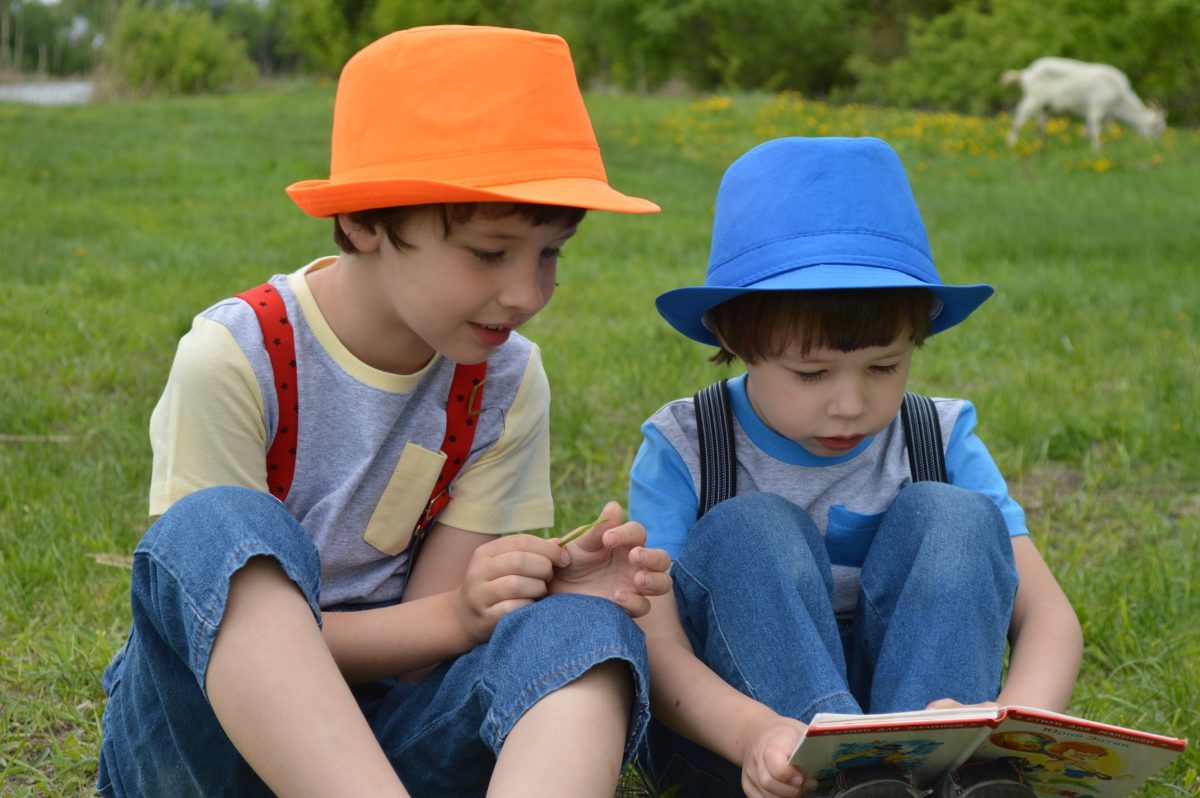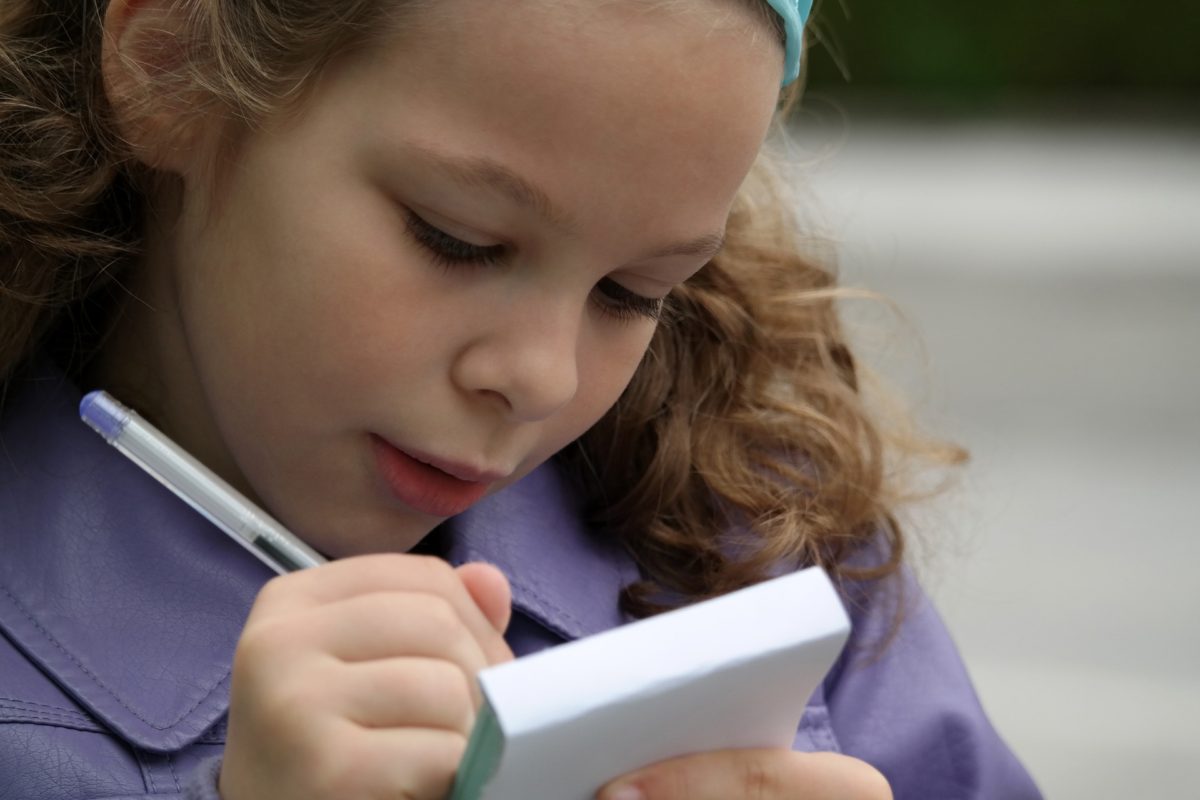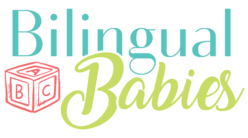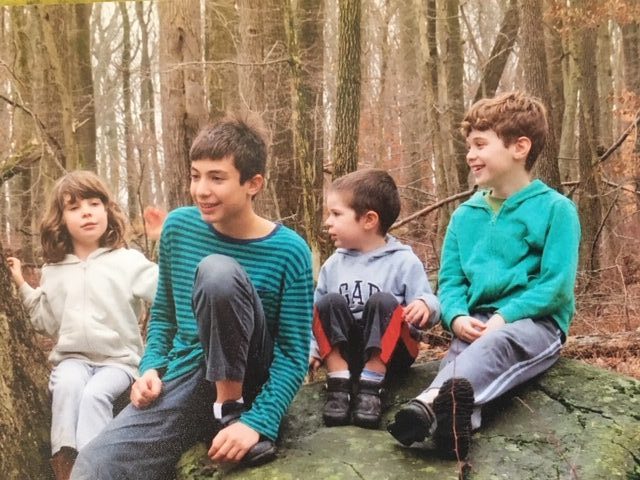Beata is a PhD computational linguist and mom of four multilingual children. She was born in Russia and grew up in Israel. Now, living in the United States, Beata and her husband raise their children with English, Hebrew, and some Russian. An interesting aspect: Beata’s children and their language experiences have inspired her to develop some interesting learning tools that can help other bilinguals around the world. An example: The Relay Reader app!
Location: USA
Parents: Mom=Russian, Hebrew, English; Dad=Hebrew, English
Children: English, Hebrew, Russian
Veronika: My first question for you is: what’s your background?
Beata: I was born in Russia. When I was a teen, my family moved to Israel.
Veronika: Is your husband from Israel too?
Beata: Yes.
Veronika: And how many children do you have?
Beata: Four. They are between 7 and 17 years old.
Veronika: That’s an interesting age range.
Beata: Yeah, for sure.
Veronika: What languages do you speak at home? Or, in other words, who speaks what to whom?
Four kids, three languages and adapting to individual language needs
Beata: Generally, at home, we speak Hebrew. That’s the language that my husband, I, and the three older kids speak. Russian is also a language in the background. But it is rather in the background because we aren’t actively speaking it. My husband doesn’t speak it; I do, my older son does reasonably well; and the other kids understand some of it, but they don’t volunteer anything in Russian. Their opportunity to practice Russian more substantially is with my parents, their grandparents.
Veronika: Do you feel they are all fluent communicating in Hebrew? Or do you find them switching to English a lot?
Beata: The three oldest usually do not switch to English. They’re capable of holding any sort of everyday conversation in Hebrew. The youngest has issues with language development in general and we were advised not to immerse him too much in our bilingual context. Rather, we were asked to talk to him in English and ask all the siblings to do that too. We have done that for a while now and he has progressed in his English. He’s much more confident now than he was a couple of years ago. Plus, he still hears Hebrew because everybody else is speaking Hebrew.  So now he is saying things in English, but also occasionally in Hebrew. We’re not trying to push too much and immerse him more in Hebrew right now. But we’ll see how things go over the next years and adjust as needed.
So now he is saying things in English, but also occasionally in Hebrew. We’re not trying to push too much and immerse him more in Hebrew right now. But we’ll see how things go over the next years and adjust as needed.
Veronika: Who gave you that advice to use English with him, if I may ask?
Beata: A speech therapist. He was having some delay in the development of English and the advice was to maybe make it easier for him and stick to one language. It wasn’t exactly sticking to one language because even if we talk to him in English, he hears everybody else talk to everybody else in Hebrew. So it’s not that the immersion got removed, but at least in directly engaging him, we did sort of move to English mostly.
Veronika: Interesting. I’m just curious because usually all the research in the area says that speech delays are not necessarily due to bilingualism.
Beata: Right. Now, I don’t think the hypothesis was that the delay was due to bilingualism. The delay was something different. They were just worried that bilingualism is an aspect that added to an already existing problem. So they advised us to stay away from it if we can. This advice was given when he was about 5 and he was not speaking at the level of a 5 year old in any language.
Veronika: It’s amazing that he is now comfortable speaking English and even some Hebrew here and there.
Beata: Yeah, that is great.
Reading, school, and traveling: Ways to promote the minority language
Veronika: What have you been doing to promote Hebrew and get your children to speak Hebrew? The reason I’m asking is that here in the U.S., English is usually quite dominant. For example, in my own case, if I don’t speak German to Ella all the time, her German declines fairly rapidly. So what did you do in order to keep up Hebrew, your children’s minority language?
 Beata: There are a few things. First of all, both my husband and I speak it. So that’s easier because we can speak Hebrew between ourselves and involve the children. Secondly, all the kids, apart from the youngest, have gone through Hebrew day school through 8th grade. So they also have instruction in Hebrew; they learned to read, they learned to write, they study Hebrew texts. Speaking mostly comes from home, but they do have additional Hebrew exposure and learning at school. And thirdly, they are spending a few weeks every summer in Israel with our extended family — with grandparents and aunts and uncles and cousins. That provides a lot of Hebrew immersion for them.
Beata: There are a few things. First of all, both my husband and I speak it. So that’s easier because we can speak Hebrew between ourselves and involve the children. Secondly, all the kids, apart from the youngest, have gone through Hebrew day school through 8th grade. So they also have instruction in Hebrew; they learned to read, they learned to write, they study Hebrew texts. Speaking mostly comes from home, but they do have additional Hebrew exposure and learning at school. And thirdly, they are spending a few weeks every summer in Israel with our extended family — with grandparents and aunts and uncles and cousins. That provides a lot of Hebrew immersion for them.
Veronika: Yeah, I can imagine. How long do they usually stay?
Beata: About 6 weeks. For some of them, it’s less; for some of them, it’s more. They don’t all go at the same time.
Veronika: Small increments to keep it manageable for the grandparents?
Beata: Exactly. It does in the end accumulate into very substantial presence there. So that’s a lot of language exposure. Also we have books in Hebrew, children’s books, so they get used to the lettering in Hebrew and hearing it in that context as well.
Experience as a mom can inspire research and development
 Veronika: Speaking of reading, that is your professional expertise, right?
Veronika: Speaking of reading, that is your professional expertise, right?
Beata: As a computational linguist and a language technologist, I do deal professionally with texts, readers, and writers.
Veronika: You developed the Relay Reader app which allows you to read a whole book, taking turns reading with a native speaker narrator. Did you draw any of the ideas from reading with your children?
Beata: Well, reading with my children was the inspiration for the app because that’s how we got going with extended reading with kids 1, 2, and 3. With my eldest son, he and I read the first Harry Potter book in relay reading style. That was a great experience. After the first book, he said, “Mom, you’re slowing me down. I’m good”.
Veronika: LOL…He did that?
Beata: Yeah! With my second son, it took us three books to get to that point. With my daughter, my husband said, “Now it’s my turn to have some fun.” So, he read with her; and then after that, she said she wants to read with mom, too.
Veronika: Here you go!
Beata: She was somewhat of a more reluctant reader than her brothers. So, with her, we also added something: after we finished each chapter, we had a drawing session where we would draw a picture about something in the chapter so she might relate better by drawing.
 Veronika: Oh, that’s cool. That’s a good idea.
Veronika: Oh, that’s cool. That’s a good idea.
Beata: A while ago, my older son, who is 17 now, said “Mom, I want to work on my Russian. Why don’t we pick a book and relay-read it in Russian?”
Veronika: Oh, nice. I love how the app has created a new verb “to relay-read.”
Beata: Well, then life sort of “interfered” and he had his APs in his junior year and wrestling and other interests. So it’s not like we progressed a whole lot, but with the little we did do, it was a good way to go about it.
Bilingual and bi-literate…
Veronika: So, are your children also bi-literate or, in the case of your oldest son, tri-literate? Can they read and write in English and in Hebrew?
Beata: Yes, the older 3 can do that. The youngest, not really.
Veronika: Got it. Did the older three children learn that at the Hebrew school, or do you think that also reading books in Hebrew with them helped them develop their literacy skills?
Beata: Let me think about that. We have not read the Hebrew books together in this relay pattern. Books in Hebrew were mostly books for younger kids, so I read the books to them.
Veronika: Okay.
…a major outcome at Hebrew school
 Beata: So I don’t know the extent to which that impacted their ability to read and write. I think their literacy skills in Hebrew were mostly developed through instruction at school because they have daily Hebrew classes in which they learn the language. They learn to write and read.
Beata: So I don’t know the extent to which that impacted their ability to read and write. I think their literacy skills in Hebrew were mostly developed through instruction at school because they have daily Hebrew classes in which they learn the language. They learn to write and read.
Veronika: The Hebrew school, is that a bilingual program that they attend or some type of immersion program?
Beata: The classes are in English. Even the Hebrew classes, the teacher generally speaks English to them to explain things; and then they learn Hebrew as a foreign language. But on the other hand, they do have daily prayer sessions that are in Hebrew since they read from scriptures which are in Hebrew. Now, the question is to what extent they actually read and to what extent they memorize these scriptures.
Veronika: Right.
Beata: Yeah. So, it’s not a bilingual school. It’s an English-speaking school. But there’s substantial instruction either directly in the language or using the language. Classes that have to do with reading the Bible, they do read it in Hebrew to a certain extent, even though the explanation and discussion are happening in English. And they also have Hebrew language classes where they are taught Hebrew as a foreign language.
Veronika: I wish that it would exist for German around here.
Beata: Yeah, it’s a lucky thing if you’re interested in preserving heritage of this sort.
Veronika: Definitely! Preserving the heritage, was that your main incentive for wanting them to be bilingual or was it contact with family back in Israel?
Beata: It was both. The contact with family is probably the bigger thing for me because we don’t want to be in a situation where they can’t communicate freely with family.
Talk among siblings: majority or minority language?
Veronika: Have you encountered any challenges other than the ones you already talked about with developing the minority language in your children? For instance, in many cases children speak the minority language with their parent(s), but default to English among themselves.
 Beata: Well, I think for us one of the important things for getting to a point where the kids mostly speak Hebrew at home and not English was the influence of the big brother. I think that was quite important in getting the younger kids to speak Hebrew; because he would always say, “Okay, how do you say it in Hebrew?” — if they tried to move into English.
Beata: Well, I think for us one of the important things for getting to a point where the kids mostly speak Hebrew at home and not English was the influence of the big brother. I think that was quite important in getting the younger kids to speak Hebrew; because he would always say, “Okay, how do you say it in Hebrew?” — if they tried to move into English.
Veronika: Yes, the regular pattern is that the kids may speak the minority language to the parents, but then amongst themselves, it’s English. So that’s really good if you have a little “language manager” there.
Beata: Yeah, it sort of started that way to an extent with the second and third kids, my middle son and daughter. But it was mainly the oldest who was vigilant. He’s 4 ½ years older than the next child. It’s a large difference in a young age, and the big brother is definitely an authority figure with his siblings.
Veronika: Did you do anything in particular to kindle that behavior in terms of being the “language manager”? In other words, did you make him your little helper when children number 2 and 3 were born? Or was that a role he assumed by himself?
Beata: He pretty much assumed it by himself.
Veronika: That’s nice and lucky!
Beata: Yes, I think it also helped that his brother and sister, from a very early age, were looking up to him in many ways. So they also followed him in this, as well…
Veronika: I’m keeping my fingers crossed that we will have the same situation and it unfolds naturally. With my second child due in October, Ella (4 years) and I have been talking about what she wants to teach her little brother. She brings up things like swimming, climbing up a ladder, and swinging on the playground. I sometimes sneak in a question like “Can you also help me teach him how to speak German? The more German he hears, the better he will be able to speak it”.
Beata: What did she say?
Veronika: She usually says, “Yes, I am going to speak German to him. I’ll teach him German.”
Beata: There you go.
Veronika: Yes, we will see how that approach of turning her into mom’s special helper goes. I think a key feature is to be consistent as a parent and establish that German-speaking environment and to highlight the importance of the language within the family.
Beata: I don’t recall having this conversation with my older son. But I think either directly or indirectly, he understood that this is something important. And, of course, once you want to talk to grandparents, it’s becoming even more important.
Veronika: Yeah, absolutely. That’s true. I think my mother and family have had a considerable impact on my daughter’s language development. Especially during the pandemic and lockdown, Ella has facetimed with my mother for almost 2 hours each day, just playing, reading books, and her German has experienced a boost in terms of development. So yes, having a larger family is of tremendous value! Okay, here is my final question for you: any advice to other parents who are either already raising their children bilingually or are thinking about it?
Persistence and patience are key ingredients
 Beata: Well, I don’t know if this advice is any news, but I would say that it takes persistence and patience. You are introducing something that other children in school or friends are not doing and they might not naturally do best by themselves especially if it’s only one of the parents who is speaking the language to them. Well, I guess a school where there are peers who can also speak or learn language together is also very helpful in this context.
Beata: Well, I don’t know if this advice is any news, but I would say that it takes persistence and patience. You are introducing something that other children in school or friends are not doing and they might not naturally do best by themselves especially if it’s only one of the parents who is speaking the language to them. Well, I guess a school where there are peers who can also speak or learn language together is also very helpful in this context.
Veronika: I agree. It’s important to connect with people on the same journey so they see they are not alone. I think that’s very important to show children that the language lives by being spoken with others. It is not a secret code that is only spoken by mommy or daddy.
Beata: Yes, definitely. Also, if it is the case that there is an extended family that does speak the minority language and maybe does not speak English, that is a big movator. It makes it very real for the child that this language is necessary for communicating well with some members of the family as opposed to just a game to play with mom.
Veronika: Right. That’s a good point. That also applies to the many parents out there who bring up their children with a second or foreign language even though they are non-native speakers of that language. They make that conscious decision to do that.
Beata: That’s right.
Veronika: Unfortunately, there is still quite a bit of controversy whether you should raise your children in a non-native language or not—in particular around the issue of accent that they are supposedly giving to the child. But I think you just give them an edge in life even if you don’t “sound native” yourself.
Beata: I don’t see the downside in that.
Veronika: Exactly.
 Beata: Lots of people speak the language well and they’re not native speakers. So, they’re using the language to do things they want to do. They read in it; they communicate with others in it; they watch movies in it and what not. So, they have it. They have it in their toolbox.
Beata: Lots of people speak the language well and they’re not native speakers. So, they’re using the language to do things they want to do. They read in it; they communicate with others in it; they watch movies in it and what not. So, they have it. They have it in their toolbox.
Veronika: Exactly.
Beata: And if you speak with some accent or another… Well, I think maybe in the U.S., it’s a little different. But in Israel, there are so many people who are not native in Hebrew and who speak with any number of different accents. I think people are used to it.
We all have an accent
Veronika: Well, technically, we all have an accent regardless of the language we speak—even in our native tongue.
Beata: That’s right. Yeah, my native language is Russian, but these days, it’s definitely the least used of the three; because I only speak Russian with my parents. So, I’m pretty sure I have developed some accent. I’m sure I’d sound somewhat off if not strange to a native speaker of Russian in Russia. But it’s just what it is.
Veronika: Yeah. But even like, let’s say if I speak my native German language, somebody from southern Germany would say, “Oh, you have a northern accent”. So, we all have accents in one way or the other.
Beata: Yeah, exactly. For some people, it could be an identifiable kind of local accent. For others, there are influences of some other language or languages in the way they speak “x”.
Veronika: I don’t think that matters a lot as long as you kind of use the language for a purpose that you are comfy with. I think that’s actually the definition bilingualism. It’s not people who necessarily speak or who are fluent in the language, but who use multiple languages on a regular basis.
 Beata: Yeah, I think, generally, being multilingual is an opener of opportunities even if you don’t have it perfectly.
Beata: Yeah, I think, generally, being multilingual is an opener of opportunities even if you don’t have it perfectly.
Veronika: Yeah, exactly. Being multilingual opens doors and allows you to build bridges.
Beata: That’s true. I think it also gives you sort of a little bit of an outsider view on language because, for monolingual people, sometimes they feel like language is part of them and natural and can’t be otherwise because it’s hard to imagine things working differently. And for multilinguals, that’s probably not quite so because any one thing can actually be realized in a different way in a different language. I found that to be quite useful in that you can think about the language “from the outside”, so to speak.
Veronika: Yeah, bottom line: language is a system. So, it’s basically a number of different systems that give you the idea, “Hey, things can work but in different ways”. There is no necessarily right or wrong way.
Beata: Yeah, and there are a number of cases where language works a bit differently; for example, at the lexical level where we label certain things differently, make different distinctions. And so, it’s quite insightful sometimes. I used to wonder whether cultures where you ‘play’ piano (Russian, English) think about it in a more lightweight, playful way than cultures where you call what you do something like ‘melodize’ on the piano (Hebrew).
Metaphors and images behind the language we use
Veronika: That’s an interesting idea. You may have a point there! I think do transport images with the words we use and they are very much responsible for how we see and conceptualize the world. These images are always there but they may be the strongest when it comes to metaphors. For example, in English you say “to kick the bucket”, in German, you say “bite the grass”. It’s a very different image.
 Beata: Yeah, that’s actually one of the areas of my professional interest, metaphor analysis and what metaphors deliver for you in communication, in particular in the context of non-native writing. It’s a context not many people associate with using metaphors.
Beata: Yeah, that’s actually one of the areas of my professional interest, metaphor analysis and what metaphors deliver for you in communication, in particular in the context of non-native writing. It’s a context not many people associate with using metaphors.
Veronika: That’s right.
Beata: It’s an interesting connection that you’re making between imagery in language, multiple languages, and metaphors. I agree that there’s a sort of meta-awareness of what language is doing. It shows and exploits the inner workings of language for a purpose.
Veronika: It’s definitely a fascinating topic! But how did we get into metaphors? LOL Well, thank you so much for all of this valuable input and insights from your own bilingual journey! That was very interesting!


